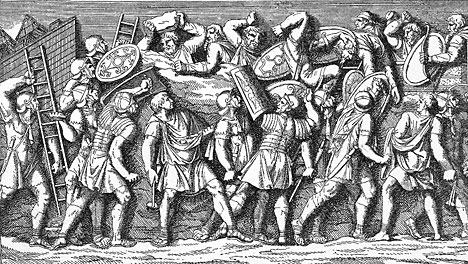Jul
2
2014
Raising Cain

“Just as Circumcision made impossible a global corruption,
so paedobaptism makes impossible a global Gospel.”
Part 1 here.
With so many young people leaving the Church, it is no wonder that there is a push to renew an understanding of biblical Covenant. Giving our children a profound sense of their “Covenant identity” is a crucial means of re-establishing the Covenant framework which has been neglected. Unfortunately, those pushing for these things are going about it in entirely the wrong way, because they are re-establishing the wrong Covenant.
Continue reading
12 comments | tags: Abel, Abraham, Babel, Baptism, Cain, Circumcision, Covenant Theology, Genesis, Jonah | posted in Biblical Theology
Dec
6
2013

[A guest post by Chris Wooldridge]
“Woe to you, Chorazin! Woe to you, Bethsaida! For if the mighty works done in you had been done in Tyre and Sidon, they would have repented long ago in sackcloth and ashes. But I tell you, it will be more bearable on the day of judgment for Tyre and Sidon than for you. And you, Capernaum, will you be exalted to heaven? You will be brought down to Hades. For if the mighty works done in you had been done in Sodom, it would have remained until this day. But I tell you that it will be more tolerable on the day of judgment for the land of Sodom than for you.” (Matthew 11:21-24)
If we are paying careful attention to the historical context of this passage, it should be clear enough that the “day of judgment” referred to was fulfilled in the Jewish war of 66-70 AD. But why then does he seem to bring Tyre and Sidon/Sodom onto the scene in verses 22 and 24? Are we dealing here with a future judgment of the inhabitants of these cities, perhaps one which awaits the second coming of Christ?
Continue reading
Comments Off | tags: AD70, Chris Wooldridge, Covenant Theology, Jonah, Josephus, Matthew | posted in Biblical Theology, Quotes, The Last Days
Sep
12
2013

And John bore witness: “I saw the Spirit descend from heaven like a dove, and it remained upon him.” (John 1:32)
“Efficacious paedobaptism is maintained at the tragic cost of the efficacious work of the Spirit…”
Chapter 1 continued
See the Baptism links page for all articles in this series.
Dr Leithart says that the sign of baptism is not merely symbolic of a personal encounter with God, but is actually the personal encounter. I concluded, based on the process of maturity found throughout Scripture, that although his observation is correct as far as it goes, what he has observed goes even deeper. “The sign” is not merely the baptism, but actually includes the human being in personal relationship with God. The one being baptized is the sign, and the sign is ethical maturity.
Continue reading
Comments Off | tags: Abraham, Baptism, Covenant Theology, Federal Vision, Jonah, Peter Leithart | posted in Bible Matrix, Biblical Theology
Nov
6
2010
or A Bigger Christendom

“In the middle of its street, and on either side of the river,
was tree of life, which bore twelve fruits,
each tree yielding its fruit every month.
The leaves of the tree were for the healing of the nations.”
Revelation 22:2
NOTE: THIS POST HAS BEEN REMIXED AND INCLUDED IN GOD’S KITCHEN.
While the governments of the first global economy in history explore areas of policy for which there is no historical precedent, Christians need to understand that even now, there is nothing new under the sun. It may be true, as some believe, that every war (including World War I) can be traced back to disputes over resources. But all the economic advice we need, whether personal, national or global, is contained in the Bible. The Tree of Life is still at the centre of the Garden, but it is the Church, and God is working on a forest. Continue reading
7 comments | tags: Economics, Gnosticism, Jonah, Paul, Postmillennialism, Samson, Tabernacle | posted in Biblical Theology, The Last Days, The Restoration Era
Jul
12
2009
“Nebuchadnezzar the king of Babylon has devoured me;
he has crushed me; he has made me an empty vessel;
he has swallowed me like a monster” (Jeremiah 51:34)
Continue reading
Comments Off | tags: Chiasm, Feasts, Jonah, Literary Structure | posted in Biblical Theology
Jul
2
2009
or Suffering as the Most Holy Place

I remember an atheist quoting one of David’s Psalms to prove that God doesn’t answer prayer. It was a song of despair. Despite such selective quoting, how do we deal with Bible passages that end without hope?
Continue reading
1 comment | tags: David, Despair, Jeremiah, Jonah, Lamentations, Michael O'Brien, Psalms | posted in Biblical Theology, The Restoration Era
Apr
10
2009
You will remember that St. Paul is another Jonah and he takes the Gospel to the Gentiles. He forsakes the Jews and, in fact, at the end of Acts 28, he really casts them off and says judgment has come upon them to the uttermost. Of course, a few years later it does—in the destruction of Jerusalem. Yet Paul says, if it were possible, I wish that I could be damned for my brethren in Israel.
Paul had the same attitude as Jonah had, of wanting to see his own people saved. But unlike Jonah, Paul is willing to obey God… he sees that God has compassion on the Gentiles in and of themselves. Jonah, however, has to be persuaded of this. Jonah is so concerned about his own congregation back home that he doesn’t want to take the Gospel elsewhere for fear that it will have bad results in Israel.
James B. Jordan, The Book of Jonah lectures www.wordmp3.com
Comments Off | tags: James Jordan, Jonah, Paul | posted in Biblical Theology, Quotes
Apr
10
2009
The prime mover in history is always God. God creates the world and tells men what to do, and men do it, and then God comes and judges them, and tells them to do something else. History moves when God speaks. That is the reason preaching is so important. When the word of God is sounded out into a culture, history begins to move. People can no longer remain neutral, or pretend to be neutral.
James B. Jordan, The Book of Jonah lectures www.wordmp3.com
Comments Off | tags: Culture, James Jordan, Jonah, Preaching | posted in Biblical Theology, Quotes
Apr
8
2009
A sample of the new ESV Study Bible was recently made available.
I liked this observation in the notes:
“Jonah’s rescue from death provides an analogy for the resurrection of Christ… The repentance of the Ninevites anticipates the wide-scale repentance of Gentiles in the messianic era.”
But not this one: “Humor, as Jonah’s behavior is not only ignominious but also ridiculous.”
When the prophets (like Elijah, Elisha and Jonah) were sent to Gentiles, it was to provoke Israel to jealousy because they would not listen to these prophets. Jonah understood his ministry meant condemnation would come upon his own people:
James B. Jordan said,
“I don’t think Jonah was some loyal nationalistic prophet. Jonah was in there every day complaining, criticising, prophesying, and denouncing the kingdom of northern Israel. It won’t do to say that Jonah didn’t want to take the Gospel to another nation. No, Jonah has something more profound in mind. Jonah was thinking about Deuteronomy 32:21. He didn’t want to take the Gospel to the Gentiles, because to do so was to bring about a curse on the Israelites. ”1
Paul was a more faithful Jonah, understanding this curse but obeying it nonetheless (Romans 9:3; Acts 28:28)
The study Bible looks good though.
1 Lectures on Jonah, available from www.wordmp3.com
[Originally posted 21 August 08]
Comments Off | tags: ESV, James Jordan, Jonah, Paul, Resurrection | posted in Biblical Theology





























